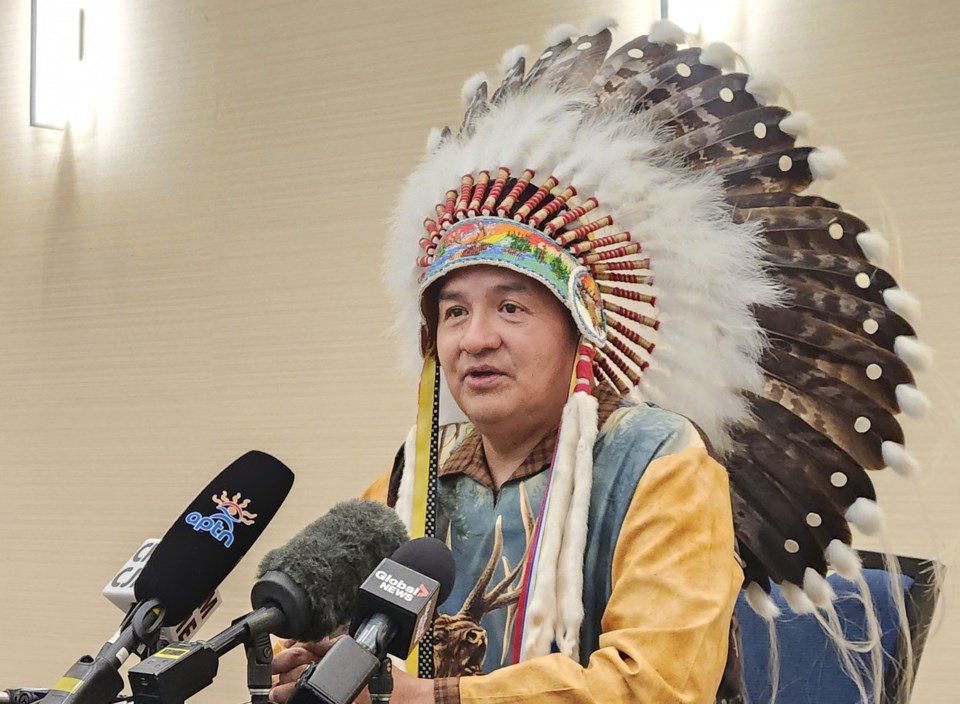SASKATOON — Federation of Sovereign Indigenous Nations Chief Bobby Cameron said people living in Western Canadian provinces cannot simply decide to secede from the country, emphasizing that the lands remain, and will always be, for Indigenous Peoples.
Cameron, in an interview with SaskToday, was responding to a statement made by Alberta Premier Danielle Smith, who said she is not calling for the province to separate but would not block any citizen-led referendum on Alberta’s independence.
“We can't help what people think or what they say. … Premier Smith can think and see what she's saying on separating and everything else, but, plain and simple, these are Treaty lands,” said Cameron.
“There are treaties signed with the British Crown, even before the provinces were formed. Our treaties are governed by international law, not federal or provincial law. So, if you, Premier Smith, want to go ahead and separate, by all means, you are free to leave. But, the lands, waters and resources still and will stay in Treaty traditional lands.”
The issue of Alberta separating and becoming independent from Ottawa resurfaced after the Liberal Party, under the leadership of Mark Carney, secured a fourth consecutive mandate in the federal election held April 28.
The Liberals are set to form a minority government after winning 169 of the 343 seats in the House of Commons. The Conservative Party, led by Pierre Poilievre, secured 144 seats and remains the official opposition.
The election results will become official once the Chief Electoral Officer confirms the elected members of Parliament in each riding. The expected date for the return of the writs is May 19.
Separatist sentiment in Alberta surged on social media after the Liberals’ win, making it a polarizing issue. Some Albertans say they feel the federal government under former prime minister Justin Trudeau had alienated the West.
Cameron said the incoming government of Prime Minister Carney should focus on more pressing issues, and Indigenous leaders like him are ready to collaborate.
“That's why we're elected. We're elected to secure these meetings and to continue to see results when we're advocating for First Nations priorities and Treaty for Treaty and Indigenous Treaty rights,” said Cameron.
“Our Treaties and Treaty rights are the most sacred. That will always be our focus. When we get into the crux of what we've been doing, the priority areas [are] housing and policing on the reserves, and addressing the drug pandemic that is plaguing our communities.”
He said eliminating the Natural Resources Transfer Act (NRTA) is one of the FSIN’s major priorities. Cameron described the Act, which was passed by Parliament and assented to in May 1930, as unlawful.
“The NRTA is when the federal government transferred resources to the provincial governments without First Nation approval, inclusion or consultation. That's an unlawful act, and we're on that path right now to addressing it and taking it to court,” Cameron said.
Provincial NDP calls on Moe to denounce separatism
The Saskatchewan NDP, in a statement on May 1, called on Premier Scott Moe to reject any notion or effort by the province to leave Canada. Shadow Minister for Jobs and the Economy Aleana Young said even mentioning the idea during debate “speaks volumes.”
“Premier Moe had two opportunities this week to shut down talk of separation — and he didn’t. Saskatchewan people deserve better than vague answers when the unity and future of the country are on the line,” said Young.
Moe has declined to rule out the possibility of a referendum on Saskatchewan’s place in Canada. Meanwhile, Alberta Premier Smith has introduced a bill that would lower the threshold required to trigger a separation referendum to 10 per cent of voters from the previous election. Quebec held two referendums on sovereignty, both of which were defeated.
Young said merely raising the idea of separation plays into U.S. President Trump’s ambitions. Trump has made veiled threats about turning Canada into the 51st state and has referred to former prime minister Trudeau as "Governor Trudeau." She also noted the risks of looming tariffs and a potential trade war.
“A referendum is exactly what Trump wants so he can pick us off one by one. Premier Smith opening the door wide to a referendum and the silence from Premier Moe could chase investment and jobs out of our province,” said Young.
“We also know Moe takes a lot of his political direction from Smith. He copied her Sovereignty Act, he copied her provincial police force, he copied her tax collection agency, and he played nice with Trump just like Smith, while Trump threatened the very existence of our country. Saskatchewan is stronger as part of Canada. Moe needs to say it — clearly, unequivocally, and without conditions — Saskatchewan is part of Canada and will always be part of Canada.”




